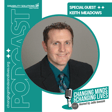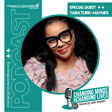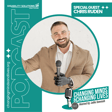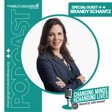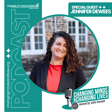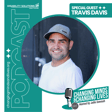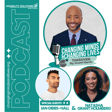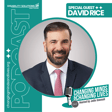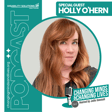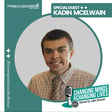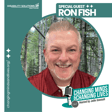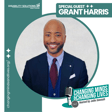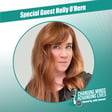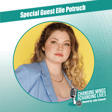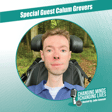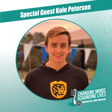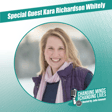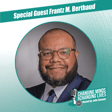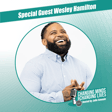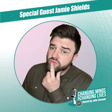Become a Creator today!Start creating today - Share your story with the world!
Start for free
00:00:00
00:00:01

CMCL Interview: Dr. Lucy Reynolds
Julie meets with Dr. Lucy Reynolds, the Managing Director of We Are All Disabled, to discuss the Affirmative Model of Disability. Dr. Lucy shares her efforts to change societal perceptions of disability through her PhD research and personal experiences. She also shares some exciting personal news contributing to her community and mission.
Transcript
Podcast Highlights and Future Directions
00:00:00
Speaker
All right, welcome to the last episode of 2024 of Changing Minds and Changing Lives podcast. My name is Julie Sewash. I am the executive director and one of the co-founders of Disability Solutions. um And just kind of thinking about wrapping up 2024 and looking into 2025, we have had so many awesome conversations in 2024 and ah people I never would have imagined to meet never would have been engaged with if it wasn't for this podcast and the opportunity to meet new people. So as we're planning 2025 and the conversations we want to have
00:00:42
Speaker
We would love to hear from you, um our our listeners, our viewers and and friends. um What are some topics or guests you want to hear from and about in 2025? What amazes me about the the world of disability is it's so big. There are so many of us and there are so many people in our community that are just doing incredible work.
00:01:05
Speaker
that there's no way for me to know all of the work that's happening. And I know that you all know so many people in our community and we would love to know the ones that you're most interested in so we can meet them and get them scheduled to have amazing conversation with conversations with us about changing minds and changing lives in
Introduction to Dr. Lucy Reynolds
00:01:25
Speaker
2025. So you guys know where to find me, LinkedIn, email, disabilities, talent.org.
00:01:33
Speaker
give us some Give us some guest names. But as we wrap up 2024, I get the honor of having another great guest that I never would have had the ah the opportunity to meet if it wasn't for this podcast. So let's introduce Dr. Lucy Reynolds, who is the founder and managing director of We Are All Disabled. Dr. Reynolds, welcome to the show. Thank you. hi that We are so excited to have you. I was just saying before we started recording, I've been spending a little time on your website and it's just so well done. And I love the quotes that are on it and the way that you kind of set everything up on We Are Disabled. But before we get into that, tell me about Dr. Lucy Reynolds.
00:02:23
Speaker
I'm Dr. Lucy Reynolds. Hi. I'm in it. I'm in it. um i so old books figure
00:02:36
Speaker
african very writes ah she's photograph director we all say we say see and che of china jesus birthday go I've had to hold you all of my life. You just like the colour of my eyes. In the middle of dogs, it is an interesting part of the way out.
00:03:04
Speaker
i just preach d perception Everything was to disability.
The Affirmative Model of Disability
00:03:18
Speaker
and I think is to challenge change sections of disability. Oh, amazing. Amazing. and so your
00:03:38
Speaker
But let me say this a different way. So your PhD research was inspired by how people perceive disability. Well, it was inspired by my own experience with disability both positive and negative. And we wanted to get what we wanted to do research into why people perceive disability and with in the way that they do Anyway, that they do, because yeah I think it's a sacred place where people see people, because they have certain qualities, and it's very visible. I have involved the I use the wheelchair, as you can see it, as you can hear by speaking in the back of this,
00:04:36
Speaker
and I really wanted to get my understanding of people's biases around way the I to supposed to yeah did this research into it and what came up with it. And I used it to record a fairly simple model of disability.
00:05:05
Speaker
Now, I'm sure you've got a reasonable head on the social model around disability, and that's around reasons we just don't have access and attitudes of barriers and But model of disability is something different. It's a non-tragic view of disability.
00:05:36
Speaker
And it's impressive the positives in disability. And it's thinking well, it's just changing our narrative around it. And look at the seeing disability the positive things, positive things both collectively and individually.
00:06:06
Speaker
not So this is it, and i was I was reading this on your website. So, you know, we've we talk a lot about, you know, there's the medical model of disability, there's the social model of disability. We even, for some work we did last year, talked about the biopsychosocial model of disability. And so there are so many ways of ah talking about it, but what I love with what you've what you're speaking of is the affirmative model.
00:06:36
Speaker
and who yeah and And I think we've talked about it that way when we're just chatting, but to like sort of put a ah nomenclature around it that this is an affirmative model, that you are not broken, that this is intrinsic to who you are, and having people with disabilities in our world is a positive thing.
00:07:04
Speaker
see we should all We should all be part of it because not disabled people, but all in four people are disabled. We've all So let's embrace it.
Impact of the Pandemic on Disability Conversations
00:07:31
Speaker
yeah and The idea I sat down for the vlog because I wanted, because in 2020 when I wanted to go out there in the public because it happened and of course everything was cancelled and I was picking the So the vlog we were going to say, so the time that we were going to say it came up for a vlog because well,
00:08:05
Speaker
How was it to say we were all marginalised from society in so great and for me that gave people my empathy and more understanding of what it could be like to be disabled. And we could be disabled by all kinds of things because we got a you know, men like her.
00:08:33
Speaker
You know, my colleague who I work with, she has anxiety. You know, for some days, it's hard for her to get out of the house, you know, and that she's, that is to say the same way. And just me interested to look at it that way. Yeah, and and i couldnt I couldn't agree more. we We really saw during the pandemic People who don't have disabilities that prevent them from being out of the house and doing things. Everyone learned what it was like to lose control.
00:09:12
Speaker
of some of the environment around you. yeah We wanted to go out, we wanted to do things, but the environment was not built for us to to do so and during COVID. and And for me and the companies and and the people that we work with that opened up conversations that I don't know that we ever would have had um ah you know with with the abled community if it wasn't for the pandemic and and what happened with our ability to move around.
00:09:42
Speaker
Yeah, exactly. So, you know, I think people in the industry prefer this way to think about how we're all living in that time. And I i also appreciate you you calling out the the mental health side, mental health disabilities, because again, those are, and me even in our own um community, a lot of times mental health disabilities get dismissed.
00:10:10
Speaker
um And for you to talk about them inclusively is very meaningful to me. And that they're not visible, and people don't see it. people don't see it before a feeling on a daily basis. So, and I think because of those, we we set up a stay, where there's a cake, a community dress, a company.
00:10:40
Speaker
in 2021, and we have what we call descriptivities. Descriptors put workshops which explore certain attitudes and behaviors in descriptors around disability to create new positive it a change. Yes.
00:11:07
Speaker
and the D-Vixxer program at Oak Ridge. We do it in a with being a comfortable. And the conversations that all, because I present the finding for research, but I also, um,
00:11:35
Speaker
talk about my own experienceability you know, yeah way that I play, for example, I have played for a little while with a poodle, and and I talk about, you know, all these issues that I experienced on a day basis, and that really encourages people to open up and be honest about their own situations and get comfortable with, comfortable
00:12:09
Speaker
And the ah the idea but behind it, we work with organisations, both as well as we with the corporate sector, but we will have a wider reach. And it's because people want to, they either want to support people um they want to better support
00:12:40
Speaker
the same people the organisation and they don't know how to do it.
Bridging Gaps Between Disabled and Non-Disabled
00:12:47
Speaker
You know what, Judy? The simplest thing is to be able to be confident, to have that and just ask, what do you need? Just ask, how do you feel? Can I help you? Can I help you?
00:13:07
Speaker
Yeah, and people are so scared. Yeah. And, go ahead. People are so scared because there's so much awkwardness around disability. And I know for my own, my own disability, people would rather shout, people would rather, if people don't understand that, it's super well done. That's what I'm saying. And I think that they would rather just, like, involve having the conversation walk away.
00:13:36
Speaker
Well then, see Yes. And you know, and that's the thing that I think is that we're missing so much is that those uncomfortable conversations and one of, you know, just being comfortable to say, can you say that again? By avoiding those, we're missing all of these amazing relationships in our lives, yeah our workplaces, because Have a great week.
00:14:07
Speaker
We're just not sure. And I like i know i everyone has their own biases and we all get uncomfortable with certain things, whether it's disability or not. And sometimes we have to force ourselves into those conversations because we're never going to get comfortable if we are not willing to just be patient with ourselves and and have time to to learn about others.
00:14:34
Speaker
And it's so important. So I love the the disruptor challenge and and that's kind of what you've been telling about us and it telling us about. And one thing that you said that I love is just an opportunity to tell their truth. And I think as a as a person with a disability, as people with disabilities, we have to also allow people who are not disabled to say things that were uncomfortable with, that that they- Oh, And that's really important.
We Are All Disabled: Origins and Expansion Plans
00:15:18
Speaker
and yeah mean i mean you do um Let talk about the words, inspiring. So obviously one,
00:15:33
Speaker
and it inspired a few other wars from the North Exchange course within the Regis World of Business, showing the business wars. Now I've got to get comfortable with this word, sorry. In the same business, there's lots of things that inspired a poor division of people who think you're and starting could you like get over the wall and you think, Dr. Warhol, you can cook a video, or you just manage these things, isn't it? that was inspired. So when I thought there's a world, actually, I'll be vice tolo a blog of both this week
00:16:31
Speaker
vo go this week
00:16:36
Speaker
I need to embrace this inspiring people a little bit because I always find because of what I'm doing, what I'm doing to help both disabled and non-disabled people to have a better understanding of a disability and better aware of this around. Our training program there, Disability Rights Training,
00:17:05
Speaker
with the difference. So, yeah, it's really important to embrace that, because, you know, I'm one of the most, this year, I'm one of the most inspiring people in the Northeast, fewer than the Northeast, in the Northeast,
00:17:31
Speaker
That is quite inspiring, isn't it? Yes, yeah. I mean, seriously, I love it. I i got your, ah got it just a little snippet. So the Northeast Chamber of Commerce in the UK gave you an inspiring female award. So I love that because you not only get to um showcase the amazing work you're doing in the disability community, but you're also a female business leader, entrepreneur. um So you've got like all of these identities that are part of you that you're being
00:18:07
Speaker
um not recognized for, but recognized for your impact and all the other women who are also disabled or not disabled get to see what it's like to see another female leader in their community. I and i mean, I'm all about the girl power and and the disability power, so I yeah love it. and Yeah, and this is not great for inclusivity within the business community.
00:18:36
Speaker
So you've got a really good business commute that, I mean, that's amazing. And that's something that, you know, you don't have. Okay. and that this is curious she okay Do you feel like, um, your, your part of, of England does better than maybe like the South or, or central parts and inclusion? Um,
00:19:02
Speaker
um ah you sure ah it said the teachers shows of in the northy bless curiosity Okay, awesome. So let's let me go back just a little bit what I would love since we we got into the conversation about you being um the the founder and the the managing director of We Are All Disabled. How did you come to start We Are Disabled and and why did you decide to take that journey as ah as a female business leader? Because I wanted to think of a voice out there. After my PhD research, I wanted to think of voice out there and I wanted to two
00:19:53
Speaker
change of the particular about disability, so like I said, it started in the book. In the book, we we to change.
00:20:18
Speaker
that That's great. So you started in 2021. And that really then, now you're doing the disruptor challenge, you're doing speaking outside of the disruptor challenge, and and using your research to really drive home yeah the need for change. Yeah, so the disruptive workshops are workshops that we run with individual organizations. And they're used
00:20:48
Speaker
to discuss, to change the narrative around disability.
00:21:01
Speaker
um No, that's fantastic. So what what do you have planned for 2025? 2025, to move this de disruptive program forward even more.
00:21:16
Speaker
and push it out iss a charge rolling a we tries to they should, corporatet corporate a and you know, both locally and nationally.
00:21:35
Speaker
oh ocean oh a it stop the girl boom and which is founded and then wolf picks aprint
00:21:50
Speaker
So we always love to end our podcast with two questions. And I never tell the two questions first, unless you've you've listened and then you'll know. um The first question is, is what is one thing that you would tell a business leader that would help change their minds about people with disabilities and our value in their workforce?
00:22:17
Speaker
I would have to get into t can to and in to because how you think about disability.
Community Engagement and Support
00:22:44
Speaker
And last question. What is something that someone did for you in your journey that helped change your life? gave me to confidence kill together out the get us out there in with a bitterke community Amazing, amazing. So Dr. Lucy Reynolds, if someone wants to connect with you, where they where should they find you? um I'm on LinkedIn and also on the website, we are all disabled.org. We are all disabled.org. So
00:23:27
Speaker
Thank you so much for helping me wrap up 2024 on the Changing Minds, Changing Lives podcast. It has been such a pleasure, ah Dr. Reynolds, and I'm sure that we will um follow your work. Congratulations on your award. And thank you for showing young women and and women with disabilities what it's like to get out there and have that confidence and and give us that inspiration, which is very positive inspiration.
00:23:56
Speaker
So you guys, thank you so much. Happy 2025. We can't wait to see you. Send us people you want to talk to, topics you want to talk about in 2025, and we will make sure it happens. Until next year, thanks for joining us.
